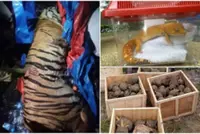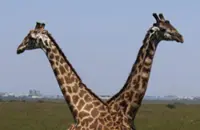Moo Deng has become an internet sensation since her birth on July 10. — Photography Lillian SUWANRUMPHA/AFP
As well as being cute, animals can also be formidable cash machines. Some, like Moo Deng, Grumpy Cat or Choupette, have become influencers in their own right – much to the delight of the Internet users who follow them on social networks, and especially that of their owners.
With her expressive eyes and chubby figure, Moo Deng has it all. So it's hardly surprising that this baby pygmy hippopotamus has become an Internet sensation ever since Thailand's Khao Kheow Open Zoo began sharing videos of her on social media. Some of them show the animal, whose name means "bouncy pig,” taking a bath or spending time with her mother, Jona.
The zoo where Moo Deng was born quickly recognised the hippo's highly viral potential and decided to make her one of its mascots. The BBC reports that 128 of the last 150 Khao Kheow Open Zoo posts on social networks have been about Moo Deng. The establishment has also created a range of clothing products bearing the effigy of this semiaquatic mammal, aimed especially at her many fans.
Indeed, many visitors are flocking to see Moo Deng in the flesh, rather than on a screen. "The number of Thai and foreign visitors on Saturday surged to 15,000 from around 2,000-3,000 for the same time last year," said Attaporn Sriheran, director of the Zoological Park Organisation of Thailand (ZPOT), speaking to the Bangkok Post.
Brands have also been riding the Moo Deng wave for commercial gain. The Thai subsidiary of the cosmetics retailer Sephora recently ran an advertising campaign for a range of blushes which, it claimed, allowed customers to "wear your blush like a baby hippo,” in a nod to Moo Deng's rosy cheeks.
The business of "petfluencers"
The hype surrounding this pygmy hippopotamus is reminiscent of the online crazes for other famous animals. Take Grumpy Cat, for example. This grumpy-looking cat, whose dental malocclusion was linked to a genetic condition called feline dwarfism, became an Internet sensation in the 2010s. She appeared in countless online memes, as well as on merchandise like T-shirts, shoes, mugs, cushions, greeting cards and more. The cat's face was seen everywhere, much to the delight of Tabatha Bundesen, her owner, and her brother Bryan. The siblings founded Grumpy Cat Limited to manage the cat's image rights and collect royalties. Grumpy Cat, who passed away in 2019, is said to have generated millions of dollars since her first photos were posted on the web in 2012.
Some animals have become stars in their own right thanks to their owners' fame. Such is the case of Choupette, the Burmese cat of the late fashion designer Karl Lagerfeld. With over 264,000 followers on Instagram, the feline is sitting on a small fortune of over €3mil (RM13.8mil), according to various sources, thanks to the many advertising campaigns in which she has starred as well as reportedly inheriting as much as US$13mil (RM53.6mil) from her late master. Meanwhile, Olivia Benson, one of the three cats owned by the American singer Taylor Swift, could be worth some US$97mil (RM400.1mil), according to the Ultimate Pet Rich List.
But when it comes to pets, they don't have to have an extraordinary physique or a well-known owner to amass followers on social networks and attract the attention of advertisers. The Internet is full of so-called petfluencers. Brands are crazy about these furry and feathered icons who manage to win over Internet users thanks to their cuteness. In a study published in the journal Psychology & Marketing, researchers from Italy's Luiss (Libera Università Internazionale degli Studi Sociali) claim that petfluencers engage consumers more than other content creators because they are seen as being more credible than human influencers.
In other words, pets make good salespeople. While their business potential is undeniable, the use of animals as ambassadors needs to be carefully considered by brands. After all, petfluencers need to be protected in the same way as their human counterparts. Moo Deng has been the victim of cruel behavior on the part of visitors to Khao Kheow Open Zoo, some throwing shells at her or splashing her with water in an attempt to get her to react. To protect their golden goose, the zoo's director installed cameras around her enclosure. He has also threatened to take legal action against anyone who mistreats the hippopotamus. – AFP Relaxnews





